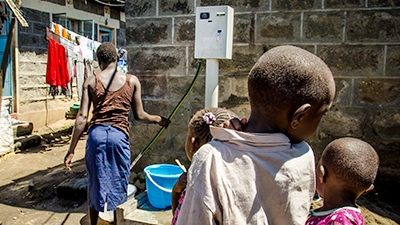With cities and towns in Africa growing at 5 percent a year —faster than anywhere else in the world -– water service providers face considerable challenges to meet growing demand. Many lack the resources to do so. The current revenue flows of most also fall far short of requirements to fund investments and run services effectively for these rapidly growing populations, particularly the poor.
Meeting the demand, especially in the rapidly expanding unserved poor settlements, requires new thinking and innovation. This is one reason why there has been a surge in interest among sub-Saharan African water service providers in prepaid water systems.
When properly planned for and maintained, prepaid water systems can deliver multiple benefits to customers, according to a new study, The Limits and Possibilities of Prepaid Water in Urban Africa: Lessons from the Field. The study, from the World Bank Group’s Water and Sanitation Program (WSP), explored the potential of prepaid water systems in serving urban poor communities in eight African cities.
The analysis found that, while inconsistencies in the performance and quality of prepaid systems remain an issue, most prepayment customers say that they have spent less money on water than they did before using the meters, and feel more in control of their consumption and expenditure. Those with their own connections added they are better able to monitor and therefore trust their bills more. The majority of customers interviewed seemed to like the meters.
At the same time, the study notes that serious consideration needs to be taken by utilities in terms of investment costs of prepaid meters (roughly four times as expensive as conventional meters, excluding associated vending and data management costs), maintenance of meters (capacity to maintain is often times not found locally), and the new ancillary services that need to be put in place (distribution of tokens, customer outreach and separate set of customer service protocols). Revenue income may not be sufficient to cover the higher costs of a prepayment system, except at relatively high consumption volumes per connection, and where service providers charge economic tariffs.
It also considers the concerns of some critics that prepaid systems would deny poor people access to water without recourse, and therefore are intrinsically anti-poor. While recognizing such risks, the authors conclude that the technology is not intrinsically anti-poor. Instead, technology is a tool, and whether or not it is poor inclusive will ultimately depend on policy, regulation and service provider priorities and approaches.
“Our findings suggest that customers care less about the technology of water services and far more about convenience, price and reliability,” said Chris Heymans, the study’s lead author. “We found that while prepaid water is not a miracle cure, many utilities and the customers they serve believe that with proper planning and management prepaid systems can bring marked benefits, such as greater control over spending on water, not incurring debt, and less constrained hours of access.”
In Windhoek, Namibia, prepaid standpipes have reduced conflict as residents are no longer penalized by disconnection if others do not pay. They now pay about half of what it costs for those who still share a bill.
“With the rise in use and demand for prepaid meters in developing countries, there was a clear need to take a closer look at this evolving technology,” said Glenn Pearce-Oroz, Principal Regional Team Leader for Africa, Water and Sanitation Program. “While prepaid water requires careful management, the limitations are not insurmountable, and solutions are often contingent on factors beyond the technology itself.”
While prepaid systems can deliver several benefits, the study, which analyzed the experiences of the sub-Saharan African communities of Kampala, Lusaka, Maputo, Maseru, Mogale City, Nakuru, Nairobi, and Windhoek, also found challenges with the technology and its implementation.
The potential of many prepayment systems is being compromised by unreliable performance, which is inconvenient and frustrating for customers, and onerous and costly for utilities. This is not unique to prepaid systems, but as a relatively new approach such problems may make it less attractive to customers and the management of service providers. Meters that are initially inexpensive to purchase can prove very costly if they fail early on and cannot be repaired quickly. If the prepaid industry is to grow, it is important to ensure that meters are reparable locally and that the supplier can offer good after-sales service and spares.
In addition, customers said they wanted more convenient access to credit loading sites and a more rapid response when faults impeded the flow of water they have paid for in advance. Disconnection from postpaid systems left them reliant on water vendors and other intermediaries who mark up their prices and offer water only at particular times.
The analysis identified a need to differentiate between applications of prepaid systems—for standpipes, individual connections, and institutional and commercial customers—each of which have different implications for their users, as well as for cost effectiveness.
The emergence of prepaid options has opened a new set of opportunities for water service providers and their customers, but the authors highlight key areas that require more robust analysis, monitoring and guidance. This includes developing:
- Standards for prepaid systems and incentivizing compliance from suppliers, as well as countering proprietorial supply arrangements that lock service providers into exclusive contracts with suppliers
- Frameworks to better help utilities decide whether to pursue prepaid systems or not
- Improved financial assessments of prepaid options before and after they had been adopted
- More robust upfront economic analyses of the costs and benefits by any service provider considering prepayment
- Tools and capacity support for monitoring and managing the performance of prepaid services.
Last Updated: Sep 01, 2014

